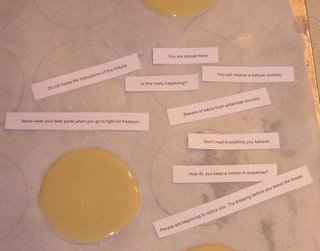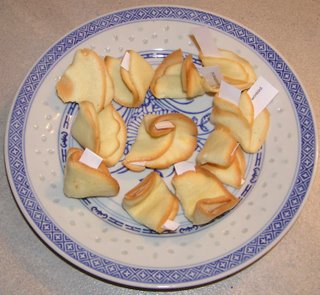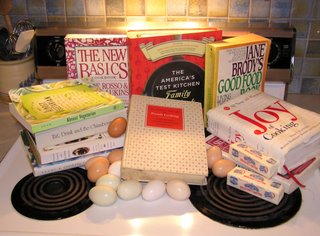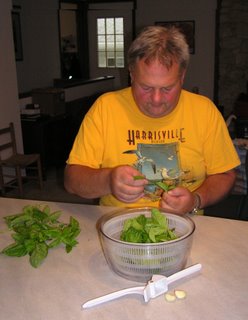You know the smell. You catch a whiff of something . . . something not quite right. But you're on your way to another room, so you walk by and forget the smell. Later, you notice it again, and it is familiar but unsettling. "Can you smell that?" you ask your family. They sniff around, and some of them can smell it, and some of them can't. The family project evaporates in indecision.
A few days (or weeks) later, you walk by and there, there is the smell. It is more noticeable now, more disagreeable. It cannot be ignored. The phone rings, you're expecting a call; you forget the smell.
On a sunny, breezy day you open all the windows and air out the house. More days pass.
Later, puttering around the sewing room, you move a forgotten box and EEEEEEEwwwwwuuurgh, you find the source of the smell. Poor wee mousie. He is not so cute now.
Cleaning the sewing room becomes an all-day project. You find small caches of sunflower seeds, a few kibbles of dog food carefully hoarded behind a stack of books. And then, horrors, your special length of black sparkly fabric is enshrouded in fluff. Black sparkly fluff. It has become a glamorous mouse nest.
More horrors appear. By the end of the day there is a body count of three. They were all tiny babies -- sad for them, but lucky for you, because the body mass was small and the mess and smell, therefore, minimal. You recall the day your little cattle dog caught a mouse in the house. It was probably the mama.
But good has been done. The fabric stash has been sorted: this stack to wash and give away, that stack to wash and keep. Bits of uncompleted projects have been reunited, labeled, and packaged securely in tight-lidded boxes. Forgotten books are reviewed and remembered as sources of inspiration and delight. Childish art, now several years old, is rediscovered and treasured.
And you vow never to ignore that smell again.
p.s. Mom, I found the Civil War quilt blocks.
Musings on books, gardening, cooking, crafts, and thoughts on how to transcend mindlessness.
Thursday, September 28, 2006
Monday, September 25, 2006
Unfortunate Cookies

I have heard of people making fortune cookies. I even seem to recall recipes for them, ones that never got off the ground in my kitchen because they called for "orange water." Eh?
But yesterday I found a simple recipe for fortune cookies in an old (May 2006) copy of Cooking Light magazine. I like fortune cookies. And these have no fat! No cholesterol! Only four ingredients! And no orange water! So I whipped up the batter and overlooked my misgivings.
First off, the batter tasted bad. With only bread flour (bread flour? tiny alarm bells in my brain began ringing.), sugar, egg whites, and vanilla, there's not much there to taste. It reminded me of the cardboard boxes that sweetened kids' cereal comes in. (Not that I've ever eaten the box, but I can imagine.)
While the batter rested in the fridge (and the brand new Pyrex measuring cup it was in exploded, necessitating a complete fridge clean-up and a quick check of the Pyrex website, which is neither here nor there), I had lots of fun looking up fortunes and fortune cookies on the web. Wikipedia, as usual, had the best information, which you can read here if you're interested. (Yes, I did make a second batch of batter.)
Making the cookies was a nightmare. (The Pyrex explosion should have been a warning to me.) Here's how:
Draw 3-inch circles on baking parchment (and can anybody find a protractor in this house? Seems like I buy one every year from the kids' list of required school supplies, but they never use them and the sneaky devices scuttle away on their pointy little legs to hide with all my good pens and scissors.)
Measure all your cups and glasses to find one with a 3-inch rim. Draw the circles. Then tape the parchment to the baking sheets.
What? Tape? In the oven? Are they nuts? No way am I cleaning baked-on glue from my cookware. Let the darned paper curl whatever way it wants. (And it does.)
Now measure a teaspoon of batter (that's a tiny little dab) and spread to cover the now alarmingly large 3-inch circles. It doesn't work. It won't spread that far. Try to hold the parchment steady while you do this. The parchment is now alive, and wiggles and crunches in its efforts to wave free.
Add more batter. Have a clue in your little head that the recipe author knows what she's talking about when she tells you to only bake three cookies at a time, and only cover three of the circles.
Figure out that adding more batter was the wrong thing to do when the cookies take 9 minutes to bake instead of 5.
Scrape the cookies off the parchment, which has developed a powerful attraction to them, lay a fortune on each one, fold in half without breaking, then fold again over the edge of a bowl. The author mentions that you might have to hold the cookies in shape for a few moments while they set. Now these cookies, which were set enough to crack upon leaving the oven, now do not want to hold a crease. Hold the cookies for about half a minute before giving up.
(Spread, bake, scrape, fold) endlessly in this ridiculous baking project that you intended to do with your daughter, but you spared her the agony and let her play computer games instead.
Go down to the basement for a Chinese rice-grain plate and discover one dead mouse and one live one. Scream. When the family does not notice, scream repeatedly until they thunder down the stairs (it takes quite a few screams).
Place the few cookies that managed to fold more-or-less properly on said rice plate and take a picture for the blog.

Present cookies to family. Have them peer suspiciously at the pale blobs, take one nibble, and declare the cookies inedible.
Write family out of will.
I will not surrender to cookie misfortune. Obviously the planets were not aligned or something. Although I may wait some time before making another attempt. I don't want my house to explode.
Monday, September 18, 2006
Cooking the Books

I want to be Julie Powell, who cooked her way through Julia Child's Mastering the Art of French Cooking
Perhaps The America's Test Kitchen Family Cookbook
Diana Shaw's Almost Vegetarian
Then again, I don't have the oomph of Julie Powell. What a woman. She managed to track down odd and sometimes out-of-date ingredients (bought a marrow bone recently, anyone?), follow lengthy and difficult instructions (boning a duck), and eat stuff I wouldn't even be able to contemplate (brains, lobster). Every day. For a year.
She cooked through a terrible job, September 11th, and the massive East Coast power outage (she lives in New York City). Not only did she eat this stuff every night, but she served it to friends and intimidating people.
In the end, what she did wasn't really about cooking a whole book, but more about transforming her life, finding meaning and joy in a time of personal and national torment. This is what awes me about Julie Powell. I wonder if the irritation Julia Child apparently showed over Julie's efforts was simply a misunderstanding of what she was really doing, or if Julia unconsciously recognized a force perhaps greater than her own in this somewhat bad-tempered New York secretary.
I'm probably not going to find Julie's courage or focus in the kitchen. A little bit of joy, though, would be good.
Monday, September 11, 2006
Trashy Traditions

It's my husband's birthday today -- he's one of those unfortunate souls who shares his day with a national tragedy. It does tend to drive home how lucky we are to be alive.
We celebrate in the traditional way, with cake and candles. Sort of. Not being organized folk, we never have matches when we need them. What we do have is a blowtorch. It has become our custom to light birthday cake candles with the blowtorch, in a sort of Red Green nod to home handiness.
And our lack of orderliness means that we're unexpectedly out of candles. Lucky I've been cleaning the basement, so I know where the Halloween candles are. Birthday tradition saved, and enhanced.
The cake upholds another trashy tradition, that of the store-bought box mix served straight out of the baking pan. I draw the line at canned frosting, however. It's gotta be homemade.
Friday, September 08, 2006
Middle School Madness


Index card wallet made from old jeans pockets and velcro -- my take on the school supply requirement for a box to hold note cards
Back to school and I'm up til the wee hours preparing every night. I'm not a student or a teacher. It ain't right.
Tonight I'm going to weigh my daughter's backpack. She can't lift it to her back; it would tip her over if she succeeded. She literally drags it into school. (We've ordered a wheeled backpack from L. L. Bean.) That a sixth-grader's school supplies should nearly outweigh her ain't right.
My son's math book has been trimmed and rebound for economy. This seems a sound practice: rather than trash the book, trim off the dirty edges and replace the scuffed cover. Its pages are extra-heavy for a long lifespan. Seems right. But the trimming process removed all the page numbers. Finding the assignment is difficult. Being sure he's on the right page is, well, nearly impossible. And how much did it cost to send the book to the cutter and rebinder? Did it travel far to get there? How much gas was used? After all, with those thick, glossy pages, the book weighs a ton (just ask my son -- or weigh his backpack). Would it be a better ecological as well as economic choice to print it more often on thinner pages and skip the rehab? I'm guessing yes. It ain't right.
Don't even ask about school lunch. The most popular choice at this middle school is the french fries with cheese sauce. Ooh, fried food with fatty cheese. Second choice? Candy and a pop. Yummy! All together, now: It ain't right.
Before I whine myself into an impenetrable cesspool of bitterness, I'd better think about what *is* right.
Gym classes are run with an emphasis on personal fitness. While team sports (with the dreaded team-picking and bench-warming) still form a large part of the curriculum, the kids also have fitness goals that include distance and timed running, sit-ups, and push-ups. I'm thrilled.
The teachers are young, energetic, and enthusiastic. Many are less than twice the age of their students. They're fresh from school themselves, with all sorts of teaching techniques they're eager to try on their students. I'm loving it.
And my kids come home smiling. They chose against the candy and pop for lunch. They've had some exercise. Their teachers have given them skills to practice and ideas to ponder. It's right.
Sunday, September 03, 2006
Ambrosia

from wikipedia
In ancient mythology, Ambrosia (Greek αμβροσία) is sometimes the food, sometimes the drink, of the gods. The word has generally been derived from Greek a- ("not") and mbrotos ("mortal"); hence the food or drink of the immortals . . . . The classical scholar Arthur Woollgar Verrall, however, denied that there is any clear example in which the word ambrosios necessarily means immortal, and preferred to explain it as "fragrant," a sense which is always suitable. If so, the word may be derived from the Semitic MBR ("amber", which when burned is resinously fragrant; compare "ambergris") to which Eastern nations attribute miraculous properties. In Europe, honey-colored amber, sometimes far from its natural source, was already a grave gift in Neolithic times and was still worn in the 7th century CE as a talisman by druidic Frisians, though St. Eligius warned "No woman should presume to hang amber from her neck." [I think I'm going to make a practice of wearing amber from now on -- Anne.] W. H. Roscher thinks that both nectar and ambrosia were kinds of honey, in which case their power of conferring immortality would be due to the supposed healing and cleansing power of honey, which is in fact aseptic, and because fermented honey (mead) preceded wine as an entheogen in the Aegean world: the Great Goddess of Crete on some Minoan seals had a bee face: compare Merope and Melissa. See also Ichor. . . .
Derivatively, the word Ambrosia (neuter plural) was given to certain festivals in honour of Dionysus, probably because of the predominance of feasting in connection with them.
In summer, we feast on pesto. Basil is our fragrant food, so potent that I suppose it must have aseptic properties (and the garlic certainly does). Although we don't yet have a vegetable plot in our yard, we planted lots and lots of basil in pots on the deck. There is more than enough to make pesto on Saturdays and Sundays simply by pruning the plants. Pesto has the taste of summer to me. What could be more summery than masses of green leaves? And what better binder than Greek olive oil? Food of the gods, I dub thee pesto.

What puts me in mind of things Greek is the most marvelous book, The Lightning Thief by Rick Riordan. This is his first book for young adults. Part American Gods and part Harry Potter, The Lightning Thief follows the uneasy growth of a teen troubled with ADHD, dyslexia, and social problems, which stem from his mixed parentage: part human, part god. My 10-year-old daughter and 13-year-old son both devoured it as voraciously as I did, and it is somewhat rare for our tastes to agree to such an extent. This book is (groan with me here) pure ambrosia.
Subscribe to:
Comments (Atom)